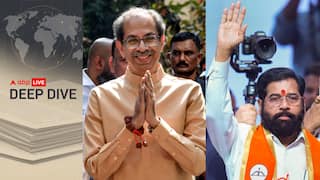India's Abstention From UN Vote On Gaza Marks A Clear Policy Shift. But What About The Future?

Israel-Hamas War: The Narendra Modi government last week made it clear once again that India is indeed re-thinking its policy concerning Israel and Palestine when it refused to either support or go against the UN Resolution adopted on October 27 calling for a “humanitarian truce” in Gaza where more than 8000 have been killed, including women and children, due to incessant bombings by the Israeli Defence Forces (IDF). Defending its stance at the UN, India said it abstained from the voting on the resolution as an "explicit condemnation" of the violence carried out by Hamas was not mentioned in the resolution. This surely gives rise to several questions and the expert commentary around India’s stance has become more confusing than it already has been since it shied away from many other UN resolutions concerning the Russia-Ukraine War.
India's actions at the UN has become a subject of much debate even as New Delhi tries hard to carve out a leadership role for itself not only among the developing and the least-developed countries, also called the ‘Gloal South’ but also within the G20, Shanghai Cooperation Organisation (SCO), BRICS (Brazil, Russia, India, China and South Africa) and many such multilateral institutions. India’s total refusal to vote for UN Resolutions dealing with sensitive geopolitical issues also makes it clear to the larger international community that New Delhi is not yet ready to take a stand on difficult global issues, something that is contrary to the “strong India” whose voice matters.
While many can argue that UNGA resolutions do not matter and countries hardly adhere by them, as we have seen in the case of Russia, and now Israel, they do indicate what a member country’s current dispensation thinking and how it wants its foreign policy to shape up in the future as the world undergoes a paradigm shift. The international community is well aware of the fact that India is eyeing a seat at the UN high table by earning for itself a permanent seat at the UN Security Council (UNSC).
New Delhi’s bid for a permanent membership at the UNSC has garnered support from a plethora of developed as well as developing countries. But while they do want to genuinely see India sitting around the global high table, they also closely scrutinise what steps New Delhi is taking in mitigating issues of global concern. And this was the right time and opportunity for India to grab that chance and sincerely work towards making the world a safer and peaceful place. Of late, we have seen that space is being increasingly taken over by China, which was credited to have established a much-needed rapprochement between Iran and Saudi Arabia this year. Beijing also came out with a ‘peace plan’ to stop the ongoing Russia-Ukraine war. However, whether it was successful or not remains to be analysed, but the point to be noted here is China at least tried. Being a key player in the region, New Delhi should have taken the lead in both of these.
From US President Joe Biden to Turkish President Recep Tayyip Erdoğan, all publicly voiced India’s bid for a permanent seat at the UNSC at the recently concluded G20 Summit in New Delhi. UK, France, Australia, Japan, Germany, Brazil, Indonesia and South Africa among others have voiced their support. All these countries and several others are watching every step India is taking. While India has taken several key steps at the UN, how it acts during matters of global emergencies will also be scrutinised.
Hamas Is Not Banned By India. Gaza Burns
In its Explanation of Vote (EOV) at the UNGA, India said, “The terror attacks in Israel on 7th October were shocking and deserve condemnation. Our thoughts are also with those taken hostage. We call for their immediate and unconditional release. Terrorism is a malignancy and knows no borders, nationality, or race. The world should not buy into any justification of terror acts. Let us keep aside differences, unite and adopt a zero-tolerance approach to terrorism.”
However, interestingly India itself also did not mention “Hamas” anywhere in its EOV, nor has it officially recognised Hamas as a “terrorist organisation”. Israel recently asked India to officially designate Hamas as a terrorist entity. But India has not even done that. So it begs a critical question, what is that India really wants and how it wants to shape its future foreign policy as geopolitics around the world changes rapidly.
Whenever India abstained from voting against Moscow and called it out for waging a war against Ukraine, questions have emerged from both sides. Neither it supports Russia, nor did it support Ukraine, and such a stance has irked both sides. The indication could be seen in Russian President Vladimir Putin’s refusal to attend the G20 Summit in-person. Unlike Indonesia President Joko Widodo, Prime Minister Narendra Modi also did not make any attempt to visit the war-hit zones of Russia or Ukraine.
Lastly, as the death toll in Gaza rises, which has even forced the United States calling for pause with President Biden stating, “We’re not drawing red lines for Israel”, India that has had a longstanding and deep relationship with Palestine could have supported the Resolution and also called out Hamas in the same breathe.
Not taking a stand is no more an option with the world facing multiple wars giving rise to an unprecedented human catastrophe.
[Disclaimer: The opinions, beliefs, and views expressed by the various authors and forum participants on this website are personal and do not reflect the opinions, beliefs, and views of ABP News Network Pvt Ltd.]



























